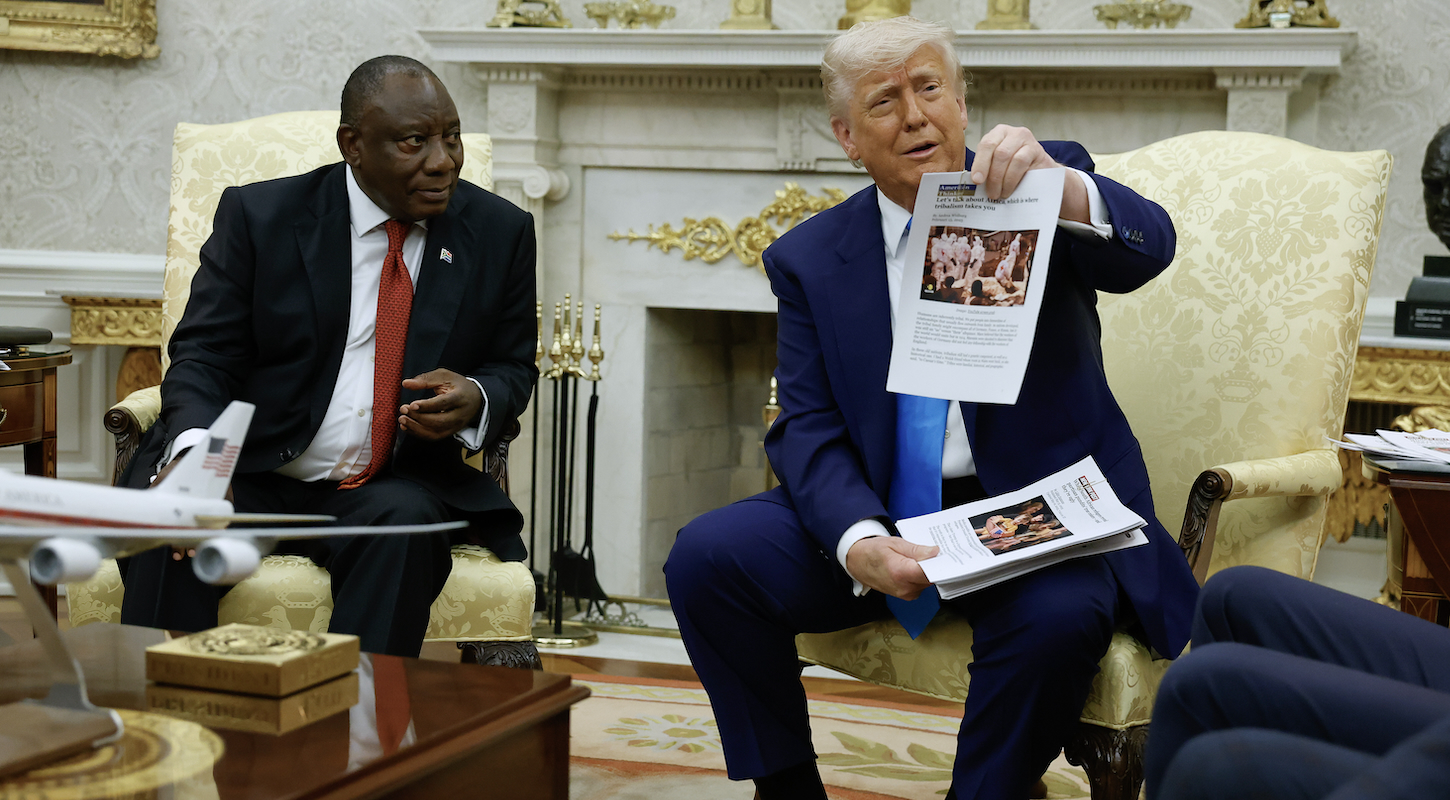Welcome to Margin of Error, a politics column from Tom Scocca, editor of the Indignity newsletter.
On Wednesday, President Donald Trump sat down for a public meeting with Cyril Ramaphosa, the president of South Africa. Perched on an armchair in the Oval Office, with the White House's newly installed gold-tone decorations stuck to the mantlepiece behind him, Trump declared that Ramaphosa is "a man certainly in some circles really respected, other circles a little bit less respected, like all of us."
Then he spent most of the next two minutes talking about golf and South African golfers, some of whom were with the delegation—"and David Frost, also another one that I know is such a great one, was he as good a putter as they say, David? He's a putter, he's a putting machine"—before coming back around to the subject of the head of state he was meeting. "I will say that, look, the president is a truly respected man in many circles," Trump said, "and in other circles he is considered controversial."
For the last two weeks or so, the political media have been filled with the faces and voices and published words of CNN's Jake Tapper and Politico's Alex Thompson, holding forth on the subject of presidential competence. The two have co-written a book, titled Original Sin: President Biden’s Decline, Its Cover-Up, and His Disastrous Choice to Run Again, and they are on an all-out publicity tour to discuss their reporting about how an aging Joe Biden, guarded by his inner circle, insisted on seeking reelection despite his depleted condition.
Plenty of politicians and donors and staffers have told Tapper and Thompson now that they had seen how Biden was faltering, but none of them were willing to say so until after Biden had publicly destroyed his chances in his feeble, halting performance in the June 27 debate against Trump. The message of their book tour, eagerly repeated across nearly every major publication, is that this was a shameful collective feat of wrongdoing. The Democratic Party failed to pick a proper candidate. Elected officials failed to defend the public interest. The press missed the story of Biden's decline or underplayed it or allowed itself to be pushed away from the truth. The lesson, therefore, is that the people who covered for Biden, who couldn't or wouldn't level with the American people, owe the country an apology.
The call for accountability sounds very righteous. But whatever the merits of those lessons may be—is an apology about Joe Biden really the No. 1 thing people want to hear from the Democrats before the next election?—the whole backward-looking Biden frenzy mostly seems like an excuse for the press to look away from the present day. Right now, the most acute problem the United States has with presidential age, capacity, and fitness is not about what people didn't know or wouldn't say about the last president. It's about what they can't bring themselves to say about the current president.
Shortly after his chit-chat about golf on Wednesday, Donald Trump ordered the lights in the Oval Office dimmed so that he could show the president of South Africa a video about what Trump believes to be the conditions in South Africa. First came a long—bizarrely, obsessively, grindingly long—montage of clips of Black South African politicians at various rallies singing or chanting about killing the Boer. None of the politicians were Cyril Ramaphosa, and the most frequently occurring figure was Julius Malema, who was ejected from Ramaphosa's African National Congress party in 2012. Then came a likewise oddly extended clip, filmed from above, showing vehicles parked along a roadway that had white crosses running alongside it.
"Now this is very bad. These are the, these are burial sites right here, burial sites, over a thousand, of white farmers," the President of the United States said. He continued:
... and those cars are lined up to pay love on a Sunday morning. Each one of those white things you see is a cross, and there's approximately a thousand of them, they're all white farmers, the family of white farmers. And those cars aren't driving, they're stopped there to pay respect to their family member who was killed. Uh, and it's a terrible sight. I've never seen anything like it. Both sides of the road, you have crosses. Those people were all killed.
This was categorically not true. The crosses were not a row of thousands of farmer graves but a protest set up in response to the murder of one white farming couple. Soon after, while flipping through a stack of printouts that he said were stories about more murders of white farmers—"Death. Death. Death. Horrible death. Death"—Trump held up a page printed out from a far-right website, saying, "Look, here's burial sites all over the place, these are all white farmers that are being buried." The photo was of bodies from the Democratic Republic of Congo.
The South African delegation, including the golfers, tried to explain to Trump that there is no program of white genocide in their country, just an overall crisis of violent crime. The president refused to let them push him off the position he had come in with, that white genocide was a solid, indisputable fact.
It was possible, reading accounts of the Oval Office event, to suppose that Trump had a plan or purpose in springing his complaints on Ramaphosa, who had been hoping to talk about trade—in the same way that his ambush of Ukrainian president Volodymyr Zelensky, assisted by vice president JD Vance and a right-wing crank in the press pool, could have been read as a strategic stunt to press Ukraine into accepting Russian peace terms. But the actual footage was something else.
Fixated as he was on supposed white genocide, Trump was even more obsessed with the fact that an NBC reporter had interrupted his transition between the video and the stack of clippings by asking about the luxury jumbo jet the administration had just accepted as a gift from Qatar to be used as a new Air Force One. Here was his response when Ramaphosa tried to tell him that Black people are being killed in South Africa:
The farmers are not Black. I don't say that's good or bad, but the farmers are not Black, and the people that are being killed in—in large numbers—and you saw all those gravesites, and those are people that—loved ones, going, I guess, on a Sunday morning, they told me, to pay respect to their loved ones that were killed. Their heads chopped off. Uh, their—they died, died violently. And you know, we're here to talk about it, and I didn't know we'd get involved here, but I will say this, that if the news wasn't fake like NBC, which is fake news, totally, one of the worst, ABC, NBC, CBS. Horrible. But if they weren't fake news like this jerk, uh, that we have here, if we had real reporters, they'd be covering it. But the fake news in this country doesn't talk about that. They don't want to talk about it. But now they have to talk about it, but they won't. They, this won't even be a subject. They'll have him talking about, Why did a country give a free—think, think of this—why did a country give an airplane to the United States Air Force? OK. The United States Air— Not to me. To the United States Air Force so they could help us out because we need an Air Force One until our—[points toward model plane] see that's Air Force One, it's being built, two of 'em being built. But Boeing's a little bit late, unfortunately. So why did they give us a plane, to the United States Air Force. That is what that idiot talks about after viewing a thing where thousands of people are dead.
This is how the president talks every day: in rambling, broken thoughts veering from petty yet grandiose grievances to paranoid conspiracies and fantasies dredged up from the gutters of the racist internet. Last month, before the nonexistent graves, it was a photo of the tattoos on the hand of the wrongfully deported Kilmar Abrego Garcia—or rather a caption of the characters "MS 13" that had been added to the photo and which Trump insisted were part of the tattoos themselves, to the point of losing his temper at ABC's Terry Moran for trying to dispute the claim.
"I think there is just such a thing as empirical truth," Jake Tapper told New York magazine, "and the Joe Biden that was on that stage the night of the debate was not able to speak in complete sentences or articulate any sort of vision for the country, and that is part of the job of being president." In a New York Times podcast interview with Ezra Klein, Tapper recalled that when Biden's answers started unraveling at the debate, his co-moderator, Dana Bash, "writes to me on a piece of paper: He just lost the election."
But there were two candidates in that debate, and Trump was, if anything, more incoherent than Biden was. He was just louder and pushier about it, blathering harder where Biden would trail off or freeze. Like Ronald Reagan before him, Trump is a trained performer; even when the content and context of his remarks suggest he has no idea what's going on, he can summon the cadences of someone being lucid and confident. Sometimes, anyway. He's doing it less and less now.
If you don't go to the trouble of watching Trump's remarks, you could miss this. If you try to watch him on video and get bored and speed up the replay to 1.25 times normal speed, his baggy, halting cadence starts to sound more like how he sounded a few years ago. If you want to read the text of what he says, good luck: The White House has stopped putting out the standard transcripts of Trump's remarks, and has removed the ones it posted before. (Tapper to Klein: "The definition of a cover-up is when you are hiding something that is an ugly fact.")
What's the difference between Donald Trump and Joe Biden? Tapper and Thompson's book narrates a distressing, spaced-out appearance by Biden at a fundraiser full of powerful Hollywood figures, which Tapper recounted again for New York magazine: "The moment in that Los Angeles fundraiser—tellingly enough, it was not a video that was shared with the public, but that somebody had taken with their iPhone—shows Biden walking to the edge of the stage seeming lost and then Obama coming and grabbing him and getting him off stage." This was remarkably like the moment when Trump froze up at a campaign town hall, except no one steered him offstage; they just left him bopping aimlessly along to music for half an hour while he was supposed to have been talking.
In the Times and New York interviews alike, Tapper brought up the question of the "proverbial 2 a.m. phone call with a national security emergency," the ultimate test of presidential trustworthiness and judgment. "We had a cabinet secretary say in the book: If you expect the president to be somebody who can be woken up at 2 a.m. because there's a national or international crisis, Biden was not capable of that in 2024."
Who believes that Donald Trump—fixated on imaginary graves and Photoshopped tattoos—is going to be able to process new and alarming information in the middle of the night, with the fate of the world at stake? This is a president who reverses his own tariff policy depending on which advisors can catch him alone at any given moment, who decides to declare he's reopening the derelict Alcatraz prison on a whim, who needs to be mollified with baby talk to keep him focused on his own budget bill.
None of this is any sort of secret. Trump clearly isn't capable of carrying out the duties of a president in any consistent, meaningful way. Until his defenders and enablers are afraid of the consequences of that, it doesn't matter.






